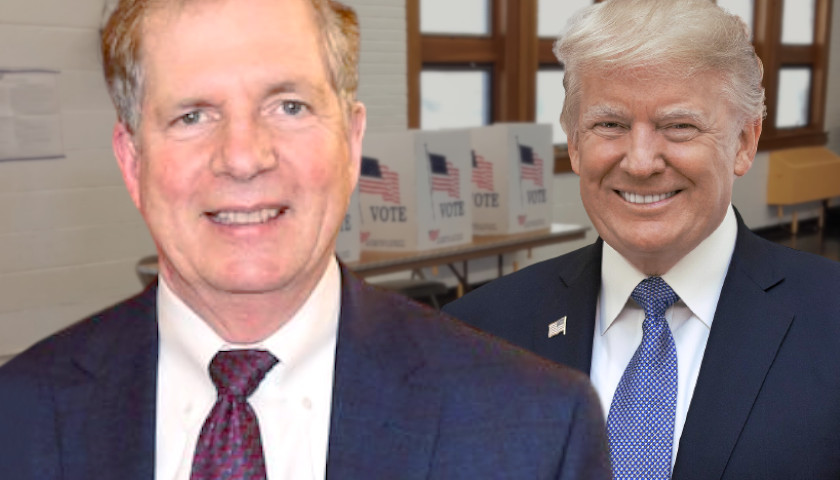by Michael Graham
Mountains of legal briefs and hours of political debate have been generated by the debate over whether the 14th Amendment will keep former President Donald Trump off the New Hampshire ballot in the First in the Nation primary. But for Secretary of State David Scanlan, the issue was resolved with a single sentence.
Trump is on the ballot because New Hampshire state law says so.
Like its law mandating New Hampshire hold the nation’s first primary in the presidential nomination system, the Granite State has a simple, clear, and direct law regarding who can be on the ballot. And both Scanlan and state Attorney General John Formella agree: As long as he meets the requirements in New Hampshire law, Donald Trump will be on the New Hampshire ballot.
“No person shall be a Senator or Representative in Congress, or elector of President and Vice-President, or hold any office, civil or military, under the United States, or under any State, who, having previously taken an oath, as a member of Congress, or as an officer of the United States, or as a member of any State legislature, or as an executive or judicial officer of any State, to support the Constitution of the United States, shall have engaged in insurrection or rebellion against the same, or given aid or comfort to the enemies thereof. But Congress may by a vote of two-thirds of each House, remove such disability.” — 14th Amendment, Section 3
Section 3 says nobody can hold any office, civil or military, who “shall have engaged in insurrection or rebellion” against the Constitution of the United States.
For weeks, opponents of Trump’s candidacy have argued Trump did just that, either on January 6, 2021, or in the weeks after when he tried to reverse the results of the 2020 election he lost. And, they say, because the 14th Amendment is “self-executing,” there’s no need for a legal finding or court ruling. State officials like Scanlan can simply declare him ineligible to seek the presidency and, therefore, ineligible for ballot access in their states.
In a press conference Wednesday, Scanlan rejected those arguments. And he did so from both a state and federal level.
Scanlan (pictured above), a Republican who served for years as deputy secretary to Democrat Bill Gardner, said New Hampshire has intentionally kept the bar low for ballot access as part of its philosophical commitment to promoting participation in its elections.
“New Hampshire is the place where anyone who had that fourth-grade dream of growing up to be president of the United States can actually come here and try and make that happen,” Scanlan said. Under the New Hampshire law that sets the requirements for being on the presidential primary ballot, he said, any candidate who “swears under the penalties of perjury that they meet the federal constitution’s requirements — a natural born citizen who’s at least 35 years old and lived in the U.S. for 14 years or more — and they pay the $1,000 filing fee, they’re on the ballot.
“There is no mention in the state statute that a candidate in the New Hampshire presidential primary can be disqualified using the 14th Amendment of the United States Constitution, referencing insurrection of rebellion. Similarly, there is nothing in the 14th Amendment that suggests that exercising the provisions of that amendment should take place during the delegate selection process held by the different states,” Scanlan said.
“There is nothing in our state statute that gives the Secretary of State discretion in entertaining qualification issues. Once a candidate swears under the penalties of perjury that they meet the qualifications to be president, and if a candidate for president properly submits their paperwork during the filing period and pays the required fee, their name will appear on the ballot.”
Soon after the secretary of state’s press conference, Attorney General Formella released a statement backing up Scanlan’s stance that the secretary has no discretion to decide who is or isn’t fit to appear on the primary ballot.
“RSA 655:47, I, requires the Secretary of State to place a presidential primary candidate’s name on the ballot if the candidate timely files a declaration of candidacy in the appropriate form and pays a filing fee,” Formella said in his statement. “RSA 655 :4 7, I, does not afford the Secretary of State discretion to withhold a candidate’s name from the ballot on the grounds that the candidate may be disqualified under Section Three [of the 14th Amendment] when a candidate has not been convicted or otherwise adjudicated guilty of conduct that would disqualify a candidate under Section Three.”
But Scanlan didn’t stop there. He also noted the U.S. Constitution doesn’t have the ability to control who appears on the ballot in the states. It only sets the rules for who can serve once elected. State governments — or, in some places like South Carolina, the state parties — set the rules for how they run their primaries.
“Each of these nominating events is designed to award delegates to the national convention who support the various candidates, and using formulas that also differ from state to state. In short, there is no uniformity to this process,” Scanlan said. “The presidential primary of New Hampshire voter will cast a vote reflecting that voter’s preference for which candidate they would like to be like to support. But effectively, what they are doing is awarding the delegates to the national convention where the nominee is to actually be determined.”
As a result, Scanlan said, there is neither the ability nor the need for New Hampshire to get into the 14th Amendment ballot-access business. That’s a question to be addressed elsewhere — most likely in the Supreme Court and after the primary is held.
Corky Messner, the 2020 GOP candidate for U.S. Senate who first brought the 14th Amendment issue to Scanlan, posted on social media Wednesday that he approved of Scanlan’s announcement.
“This is the first step to have the U.S. Supreme Court provide the legal basis to make a decision,” Messner said. “This is how the legal system works and with the other states litigating this issue, there will be several states going to the U.S. Supreme Court. The Constitution matters.”
But progressive North Country attorney Theodore Bosen doesn’t agree. In an editorial for NHJournal he wrote:
“New Hampshire Secretary of State David Scanlan, who is bound by both state law and the U.S. Constitution, is derelict in his duty for failing to bar Trump from the New Hampshire ballot. His excuse:
“At a time when we need to ensure transparency and build confidence among voters around the country, the delegate selection process should not be the battleground to test this constitutional question.”
“The only transparency evident here, however, is that the secretary will clearly abdicate his constitutional duty and selectively confine it to determining whether a candidate is 35 years of age or born in the U.S.
“If Benedict Arnold came back today to declare his candidacy for the Republican nomination in the New Hampshire primary, would not Scanlan disqualify him based upon the known fact of his having been a traitor? This is no different. Both Arnold and Trump are proven enemies of the United States.”
During the press conference, Scanlan insisted there were no partisan considerations in his decision. Instead, he offered a warning to his fellow state election officials who might be tempted to tip the scales against the likely GOP nominee: Don’t.
“The effort to … encourage individual secretaries of state to rule separately on the 14th Amendment disqualification issue, under our presidential primary practice, does not make sense in a situation where some states permit a name to appear on the ballot and other states disqualify it,” Scanlan said. “Chaos, confusion, anger, uh, and frustration that will be the result.”
– – –
Michael Graham is Managing Editor of insideSources.com.
Background Photo “Voting Booths” by Tim Evanson. CC BY-SA 2.0.









Trackbacks/Pingbacks